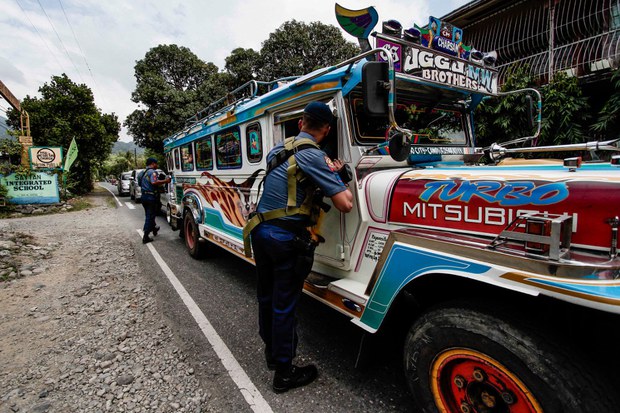Exiled Communist Leader Voices Reluctance to Return to Philippines
2018.04.24
Manila and Cotabato, Philippines
 Regional public safety personnel man a checkpoint along a road in La Union, a remote northern Philippine province, after communist New People’s Army guerrillas attacked a mine in the area, Feb. 10, 2017.
Regional public safety personnel man a checkpoint along a road in La Union, a remote northern Philippine province, after communist New People’s Army guerrillas attacked a mine in the area, Feb. 10, 2017.
The exiled leader of the long-running Philippine communist insurgency told BenarNews he was reluctant to accept an invitation from President Rodrigo Duterte to come home to negotiate peace, saying this could put his life at risk from saboteurs.
In a statement sent late Monday from the Netherlands, where he has lived in self-imposed exile since 1987, Jose Maria Sison said he welcomed guarantees for his safety from Duterte, but the offer exposed him to dangers from certain quarters, which he declined to name.
Going home now would only “expose not only myself, but also the entire peace process to extremely high risks of violent sabotage and termination by spoilers who are out to terminate the peace process once and for all,” Sison said.
He would return only after peace negotiations had made a significant advance and when his comrades and lawyers were satisfied with security precautions, he said.
During a speech in the eastern city of Legazpi earlier on Monday, the president had invited Sison – his one-time university professor – to return to the Philippines, promising that the government would pay for all his expenses.
“I will give you complete freedom to move. I will not harass anyone and I will order the military and the police to be nice to you,” Duterte said.
He also guaranteed Sison freedom of movement on condition that he and his aides left their weapons inside a military camp.
At the same time, Duterte said, he would set a 60-day window for the Communist Party of the Philippines (CPP) to restore peace negotiations with the government. When that window would begin was not clear.
When he took office in 2016, the president, a self-described leftist, made one of his first official acts to engage the communist rebels in talks aimed at ending one of Asia’s longest running insurgencies. He also freed detained top CPP officials to join talks held in Europe.
But late last year, the president terminated negotiations and accused CPP’s armed wing, the New People’s Army (NPA), of violating a ceasefire pact by staging attacks.
He had also asked the Justice Department to designate the CPP-NPA a terrorist organization, complicating a resumption of talks because the state has a policy of not negotiating with terrorists.
“I declare that I will certainly return home when a significant advance in the peace negotiations has been achieved,” Sison told BenarNews, adding he was confident that back-channel negotiations would make headway.
Rebels captured
Meanwhile, government security forces said they had captured a communist rebel leader and two of his followers after a gunbattle in the southern town of Massim.
The suspects were captured on Monday night and Tuesday after resisting troops who were responding to information about the presence of NPA guerrillas in the area, regional army spokesman Maj. Ezra Balagtey said. The suspects in custody were identified as Pablito Torno, an NPA unit leader, and Sarah Balabang and Bactira Masalon.
The NPA has been waging a guerrilla campaign in the countryside since 1969.
Military estimates placed the NPA strength at more than 5,000 men scattered in more than 60 guerrilla fronts throughout the Philippines.







